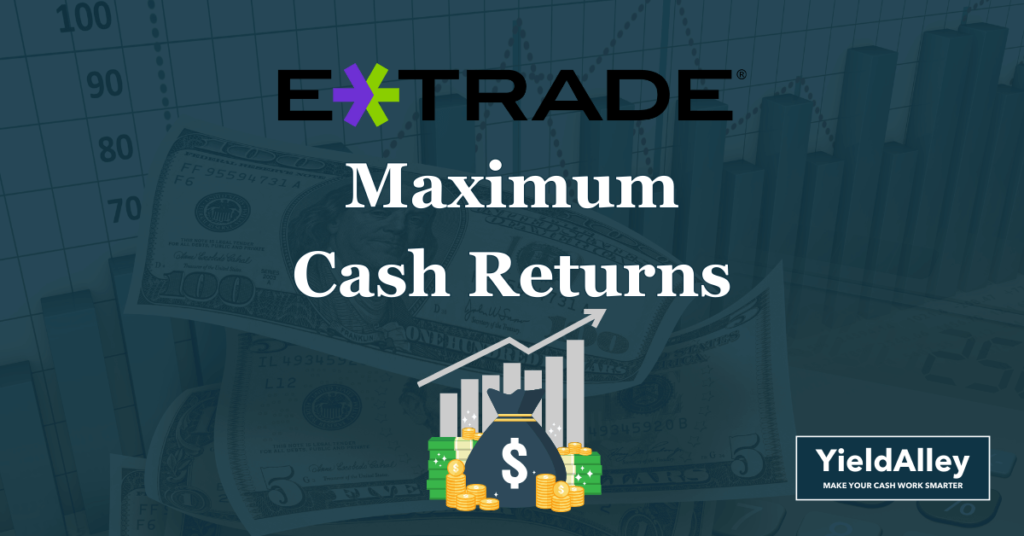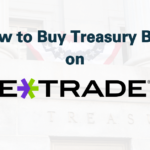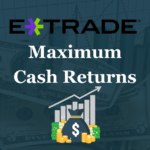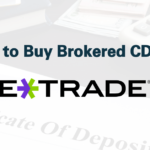Cash on E*Trade can be put to work and earn additional yield. In this article, we’ll walk through the available and best options to earn income on your cash on E*Trade. On E*Trade, you can buy money market funds from large investment firms such as Vanguard, brokered CDs, Treasury bills, and ultra short-term Treasury ETFs. These investments are straightforward and low-risk. We’ll also explain which investments have super low costs so you get the best yield for your buck.
E*Trade Money Market Funds
Let’s get the bad news out of the way first. After its acquisition by Morgan Stanley in 2020, E*Trade no longer offers sweep accounts with its money market funds.
However, it’s simple to manually buy these money market funds. E*Trade provides a variety of options of funds from Vanguard, Federated Hermes, Allspring, Gabelli, and of course its parent company Morgan Stanley.
E*Trade offers money market funds across three categories:
- Government & Treasury money market funds
- Municipal money market funds
- Prime money market funds
Because we’re focused on cash investments, we’ll primarily discuss government and Treasury funds. These funds are considered the safest and most liquid money market funds on E*Trade’s platform.
Government Money Market Fund
Treasury money market funds solely invest in U.S. Treasury bills. Government money market funds will invest in U.S. government-backed securities such as agency bonds, in addition to Treasury bills. Because Treasury bills are directly backed by the U.S. government, these government and Treasury money market funds are considered some of the investments in the world.
E*Trade offers several money market funds, but we’ll highlight the following funds. Whereas other funds require a significant minimum investment starting at $100,000, these funds only require a more modest minimum investment:
- Vanguard (VUSXX, VMRXX, VMFXX)
- Gabelli (GABXX)
If you’re familiar with Vanguard funds, then the ones on E*Trade should ring a bell. These are the same funds that you’d buy on Vanguard. We have gone into great detail about the pros and cons of each in our Vanguard money market fund article. In general, these funds are all safe choices, and all require a minimum investment of $3,000.
Our other option is GABXX (Gabelli U.S. Treasury Money Market Fund), which invests exclusively in U.S. Treasuries, like Vanguard’s VUSXX. However, GABXX requires a minimum investment of $10,000.
Of the available choices, we have a preference for VUSXX (Vanguard Treasury Money Market Fund) and GABXX (Gabelli U.S. Treasury Money Market Fund). These two funds exclusively invest in U.S. Treasury bills, which means they’re the safest type of money market fund. U.S. Treasury-only funds also offer a state tax exemption (GABXX offered a 100% state tax exemption in 2023, whereas VUSXX offered 80%) and generally charge lower expense ratios.
Prime Money Market Fund
E*Trade also offers prime money market funds, which invest in assets such as short-term corporate debt in addition to the low-risk investments that a government money market fund will hold.
On E*Trade, we would recommend PCOXX (Federated Hermes Prime Cash Obligations Fund) or WMPXX (Allspring Money Market Fund) as our prime money market choices. These funds have no minimum investment requirement, are open to new investors, and have a net expense ratio of 0.20%. FMPXX (Fidelity Investments Money Market Portfolio) would be our other recommendation, but’s currently only open to existing shareholders only.
Our Opinion on E*Trade Money Market Funds
Here is a table comparing the different E*Trade money market funds for both government and prime funds.
Best viewed on the desktop for a full comparison. Data as of January 2024.
Here’s our opinion on E*Trade money market funds: We recommend the Vanguard government funds as well as the Gabelli Treasury Fund (GABXX). These funds are extremely safe but currently still have yields that are competitive with prime money market funds. In addition, they benefit from a state tax exemption for the income earned.
To learn more about E*Trade money market funds, check out the following article:
Treasury Bills on E*Trade
Treasury bills (also known as T-Bills) are U.S. Treasuries with a maturity of less than one year. It’s very straightforward to buy a T-Bill on E*Trade ourselves.
Why would we want to buy a T-Bill ourselves? The main reasons are when the T-Bill yields are higher than money market fund yields, guaranteed state tax exemption, and avoiding the money market fund expense ratios.
If you asked us to choose between a T-Bill versus an E*Trade money market fund, we would stick with the money market funds for now. However, in the last year, there were moments when the T-Bill yields were significantly higher than rates offered by E*Trade money market funds. In those cases, it’s worth buying T-Bills directly ourselves. You can read our “How to Buy Treasury Bills On E*Trade” guide to learn the step-by-step process of how to do this on E*Trade from start to finish.
To learn more about Treasury bills on E*Trade, check out the following articles:
Bank CDs on E*Trade (or Brokered CDs)
The third route for higher cash returns is to buy bank CDs on E*Trade. Bank CDs sold on a brokerage are known as brokered CDs. E*Trade brokered CDs offer higher yields than normal bank CDs. This is due to the competitive nature of CDs being listed on a brokerage. In addition, E*Trade may negotiate higher CD rates from the banks that are issuing them.
Be aware of two things when buying a brokered CD:
- These CD rates are guaranteed only if held to maturity. However, some brokered CDs are callable, which means the bank issuing the CD can recall them early. This is typically done when rates go down, so the banks won’t have to pay a higher interest rate. To prevent this, buy a non-callable CD to be able to hold the CD to maturity.
- Brokered CDs are liquid, meaning you can sell them on E*Trade’s secondary marketplace before they mature. But the secondary CD marketplace isn’t always super active, so you might not get the price you want to sell your CD at. Regardless, brokered CDs are still better and more liquid than regular bank CDs that force you to pay an early withdrawal penalty.
To learn more about E*Trade brokered CDs, check out the following articles:
- What are Brokered CDs?
- E*Trade CD Rates
- How to Buy CDs on E*Trade
- Bank CDs vs. Brokered CDs
- Bank Hopping For the Best CD Rates
Ultra Short-Term Bond ETFs (Money Market ETFs) on Fidelity
The last method to earn higher cash returns on E*Trade is to buy money market ETFs. Also known as ultra short-term bond ETFs, these investments are newer and thus underappreciated and unrecognized compared to the previous investments we mentioned.
There are two main types of ultra short-term bond ETFs:
- Treasury ETF
- Floating rate Treasury ETF
Treasury ETFs hold very short-term Treasury bills, just like Treasury-only money market funds.
The most popular ultra short-term Treasury bond ETF is SGOV (iShares 0-3 Month Treasury Bond ETF). SGOV was introduced in 2020 and holds T-Bills with a maturity of 3 months or less. As of January 2024, SGOV currently has a yield of 5.17% with a 2023 return of 5.12%.
Floating rate Treasury ETFs, on the other hand, hold Treasury floating rate notes that always reflect the latest 3-month T-bill rate, which resets every week. In simple terms, you are always getting the most up-to-date 3-month T-Bill rate by holding these ETFs. As interest rates rise, floating rate Treasury ETFs pay higher interest payments. If rates fall, the payments decrease.
The most popular floating rate Treasury ETFs are USFR (WisdomTree Floating Rate Treasury Fund) and TFLO (iShares Treasury Floating Rate Bond ETF). USFR has a yield of 5.44% and a 2023 return of 5.18%, while TFLO has a yield of 5.39% and a 2023 return of 5.17%.
Ultra short-term bond ETFs are our preferred holdings for our cash. They have higher yields than E*Trade money market funds, are easier to buy than T-Bills, and are more liquid than brokered CDs.
ETFs, including ultra short-term bond ETFs, usually have a settlement period of two business days (referenced as T+2), which means cash will be available in your account two days after you sell. So it’s still extremely liquid, but you won’t have access to your cash instantly. In most cases, this is just fine for us.
To learn more about ultra short-term ETFs, check out the following articles:
Comparing Our Cash Returns Options on E*Trade
We’ve now reviewed the main types of investments to consider for higher cash returns on E*Trade: money market funds, Treasury bills, CDs, and ETFs.
To compare your options on E*Trade, we put together the table below that compares each investment’s yield, fees and costs, minimum investments, “sweep” features, and tax benefits if any.
Best viewed on the desktop for a full comparison. Data as of January 2024.
You can take matters into your own hands and earn more yield while still staying liquid. We have a preference for the floating rate ETFs as they earn you the most updated 13-month T-Bill rate every week.
Don’t let your cash sit idle. It can be put to work and earn you virtually risk-free money, and significant returns in today’s market. Move your cash from your bank to E*Trade (or any other brokerage that you use) and start earning yield!





